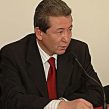
Kyrgyz Security Structures Plagued by Corruption
Publication: Eurasia Daily Monitor Volume: 5 Issue: 234
By:

In an effort to allay fears of rising Islamic extremism in Kyrgyzstan, Secretary of the Kyrgyz Security Council Adakhan Madumarov has held several meetings with residents of Nookat, Kara-Su, and Uzgen districts in southern Osh Region. Unrest in Nookat District on the October 1 Eid al-Fitr holiday was allegedly fomented by supporters of the banned Hizb-ut-Tahrir Islamic organization, which sparked fears within the Kyrgyz government about demonstrations used to promote religious separatism. The authorities have promised a crackdown on such groups in an attempt to stifle their development in the southern part of the country. “Punishment for banned religious movements will be stepped up. Such measures have already been taken in Russia, Uzbekistan, and Kazakhstan,” said Madumarov.
Behind the talk of “punishment” for such groups and the individuals involved, however, the Kyrgyz government is plagued by major weaknesses within its defense and security structures. Security challenges presented by Islamic extremism within the country or potentially by terrorists transiting its territory expose fissures and inadequacies inside the very structures tasked with responding to such threats. In the regime’s present political crisis, it may well be that such “threats” are being used to deflect attention of the disaffected Kyrgyz populace from the rolling power cuts and blatant government corruption (Kyrgyz Television 1, November 27).
There is more openness in official agencies with regard to corruption, but this may be part of a wider government-led campaign to give the impression that the system is actively addressing these issues while those at the top benefit from corrupt practices. On November 25 the Interior Ministry listed its own most corrupt departments, and the criminal investigators were at the top of the list. The head of the Interior Ministry’s internal security service, Karakeldy Kydyrbayev, said that almost 60 officers from Interior Ministry agencies were sacked in 2008 for various violations, 39 criminal cases were launched, 36 crimes were recorded, and only 17 cases of bribery were prevented. This pervasive corruption, which the Bakiyev regime has promised to deal with since the Tulip revolution, also permeates other official bodies. (Kyrgyz Television 1, Bishkek, November 25).
On December 3 Kyrgyz Interior Minister Moldomusa Kongantiev signed an order reshuffling positions at the Interior Ministry. Police Major-General Osmonaly Guronov was appointed head of the Interior Ministry’s ninth department. After being in charge of the Interior Ministry’s department for fighting drug trafficking, Zarylbek Rysaliyev became the new head of the department for fighting organized crime. Bakyt Parmankulov, the former head of the department for fighting organized crime, was moved to the post of deputy head of the Bishkek city directorate of police in charge of operational work. Kapar Batyrkanov was appointed deputy head of the Chuy regional police directorate, while Madiyar Kuluyev, the previous deputy head of Chuy regional police directorate, has now become the head of the department for fighting drug trafficking (AKIpress News Agency, Bishkek, December 3). The regime, when faced with criticism about corruption in official agencies, resorts to reorganizations, while failing to tackle the deep-seated issue of state corruption.
Kyrgyz Defense Minister Colonel Bakytbek Kalyev recently commented on the perennial problem of the military draft. Faced with severe problems relating to conscription, the Kyrgyz government intends to professionalize its military structures, although in the meantime it will revise the fees for alternative service. According to Kalyev, the main problem of the Ministry of Defense (MoD) during the spring and fall conscription is the number of able-bodied men that can be drafted into the armed forces. Of the approximately 205,000 men of conscription age, 130,000 cannot be called up owing to physical or mental illness. During the fall call up from early November to early December, more than 4,000 people were drafted, while another 25,000 will perform alternative service (Komsomolskaya Pravda v Kyrgyzstane, November 13).
Avoiding military service is not difficult in Kyrgyzstan. Potential conscripts can read various methods of avoiding conscription on the Internet. The usual way involves entering a university that has a military department. Some prefer to fake illness, allergies, or even disabilities. Others feign religious conviction to slip though the conscription net. In some cases, however, more extreme measures are taken, including deliberately fasting for a period before the physical check up or gaining weight; as underweight and overweight males can successfully evade the draft. In rare cases, some go so far as to break the bones in their. The MoD acknowledges that military service is unpopular (Komsomolskaya Pravda v Kyrgyzstane, November 13).
The security bodies in Kyrgyzstan, whether in the defense or interior ministries, suffer from problems ranging from health issues to endemic corruption, which could only be fixed through targeted and long-term time approaches to reform. Corruption destroys these institutions’ ability to focus on real security threats, and reshuffling personnel is unlikely to provide any lasting solution. Moreover, the state’s limited capability to monitor and assess the growth of internal separatism or religious extremism undermines Bishkek’s awareness of the real security picture inside the country.




